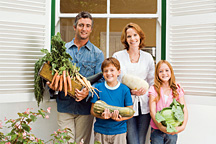To Your Health
May, 2009 (Vol. 03, Issue 05) |
|
|
Today's organic food market is expanding rapidly; organic options are readily available in health food stores, supermarkets, and even from online distributors.
However, while availability is increasing and costs are coming down, it can still be a challenge to find a good selection in the organic food aisle. This is where you can take the initiative and advantage of a few square feet of sun-drenched window sill to grow your own.
Growing Your Own Garden of Good Food
There is probably no better way to gain access to the healthy organic foods your body craves most than by growing them yourself. More and more people are getting on the home-gardening bandwagon as food, fuel and energy costs continue to rise. Home gardening, especially organic gardening, can be a great help in avoiding the consumption of manufactured foods and offset some of the cost concerns with organic produce. Some of the most popular homegrown organic foods include the following:
- Herbs (peppermint, dill, chives) and greens (arugula, lettuce, spinach)
- Vegetables (tomatoes, chile peppers, cucumbers, zucchini, green beans)
- Fruit plants (raspberries, strawberries, blackberries)
For plants, healthy nutrition begins with the most basic elements - sun, water, fertile soil and perhaps a green thumb. These elements and a few seeds are all you need to produce nutrient-packed organic foods at home. For your organic garden, first pick a sunny spot. You can grow a variety of organic foods, like salad greens and herbs, simply by tending to a patch of lawn in the back yard or a couple of planted pots or boxes on your patio or balcony. As long as the area gets a lot of sunlight, you should have many growing options. Keep it simple. Organic gardening isn't necessarily about flair, but rather function.
 Next, tend to the soil. The best soil for organic growing is dark, rich, crumbly top soil enriched with natural fertilizers, preferably manure or compost. By regularly feeding the soil, you are providing more food for the plants you will eventually eat. Keep the soil, seeds and plants watered, weeded, and protected using natural means. This means cultivating, mowing, hand-weeding or covering crops instead of using herbicides for weed control, as well as using natural plant oils, soaps and beneficial bugs to control harmful pests. Encouraging bees, butterflies and other wildlife to visit your organic plants and garden is actually essential because they help maintain the natural harmony and balance necessary for organic growing.
Next, tend to the soil. The best soil for organic growing is dark, rich, crumbly top soil enriched with natural fertilizers, preferably manure or compost. By regularly feeding the soil, you are providing more food for the plants you will eventually eat. Keep the soil, seeds and plants watered, weeded, and protected using natural means. This means cultivating, mowing, hand-weeding or covering crops instead of using herbicides for weed control, as well as using natural plant oils, soaps and beneficial bugs to control harmful pests. Encouraging bees, butterflies and other wildlife to visit your organic plants and garden is actually essential because they help maintain the natural harmony and balance necessary for organic growing.

